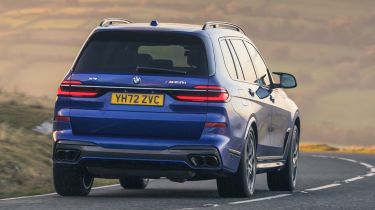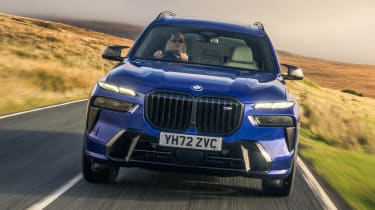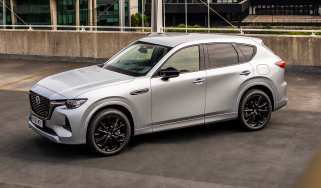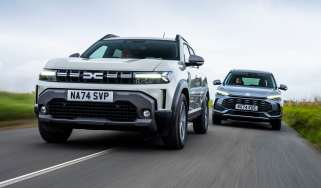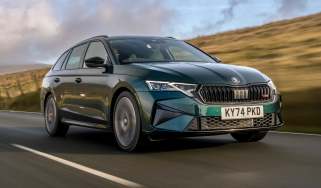BMW X7 review - Engines, performance and drive
The X7 is one of the best large SUVs to drive, but certainly feels its size

BMW has a reputation for making some of the best-driving cars in their respective classes and, remarkably, this extends to include its largest, heaviest model. The X7 is not a sports car by any means, but is a two tonne-plus SUV that manages to not embarrass itself when the roads get twisty.
It’s certainly not engaging, but never feels uncomfortably vague or out of its depth – which is something that can’t be said of all the big SUVs in its class. Diesel and V8 engine variants make decent work of the X7’s mass, but the 40i straight-six petrol does need to be revved despite its turbocharger and hybrid-assisted torque-curve.
By and large, the X7 rides well – its air springs are set up quite softly for a modern SUV and help portray a smooth ride over all varieties of rough British tarmac. On cars with larger 22- and 23-inch wheels, smaller bumps and vibrations can find their way into the cabin, though, so it lacks the true magic carpet ride quality of a comparable Range Rover.
Overall the X7 is surprisingly good from a driver’s point of view. The usual BMW traits of well-weighted steering, large reserves of grip, smooth automatic gearboxes and responsive engines means the big SUV is easily better to drive than a Land Rover Discovery.
0-62mph acceleration and top speed
The X7’s three available engines are all very impressive, each representing high watermarks in their respective classes. The 40i straight-six petrol is a ‘nearly’ all-new engine from BMW, not only integrating the 48V mild-hybrid system and its electric ISG (Integrated Starter Generator) motor, but also a brand new cylinder head and revised combustion chambers.
More reviews
This has allowed BMW to switch over to a more efficient Miller combustion cycle, streamlining the engine’s efficiency while increasing power and torque at the same time. The changes liberate an extra 46bhp compared to the previous 40i, with BMW rating its new engine at 381bhp, backed up with 540Nm of torque available from just 1,850rpm. Performance times are more than adequate for a luxury family car of this size, reaching 62mph in 5.8 seconds.
While this extra performance helps the 40i make less work of its 2,490kg kerb weight, the 40d diesel is still the preferred choice, compromising only slightly on power with 347bhp, but countering on torque which is a much more impressive 740Nm from just 1,750rpm. Its 0-62mph time is only 0.1 of a second down at 5.9 seconds, but thanks to the extra torque the performance is much more accessible and makes the car’s slightly heavier 2,545kg kerb weight seem even less of a burden.
The flagship M60i features a 523bhp twin-turbocharged V8 that you’ll also find under the bonnets of the latest Range Rover and Range Rover Sport. In this application, its performance is potentially a bit of overkill with a 0-62mph time of 4.7 seconds, but to many potential buyers the extra opulence emanating from a burbling V8 ahead of you is just as important as its improved on-paper performance figures.
In all three cases, the ISG motor is mounted within the gearbox housing and acts as both a starter motor and generator. Regenerative brakes capture kinetic energy in a small lithium ion battery, enabling that small ISG to assist the engine at low revs and under hard acceleration. The effect is subtle, but does successfully streamline the engine’s operations and makes all the powertrains very smooth thanks to some deft calibration between engine, electric motor and eight-speed gearbox.
Which Is Best
Cheapest
- NamexDrive40i MHT Excellence 5dr Step Auto
- Gearbox typeSemi-auto
- RRP£89,480
Most Economical
- NamexDrive40d MHT Excellence 5dr Step Auto
- Gearbox typeSemi-auto
- RRP£90,105
Fastest
- NamexDrive M60i 5dr Step Auto
- Gearbox typeSemi-auto
- RRP£113,645

